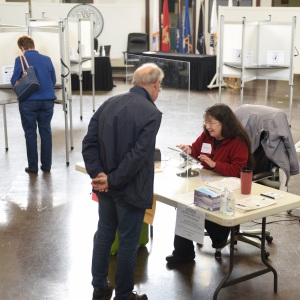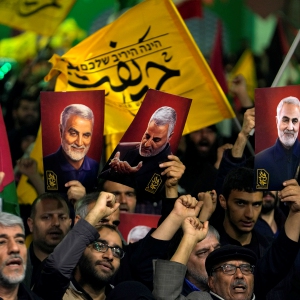Guest columnist Shalini Bahl-Milne: Beyond empathy — A compassionate approach to polarizing issues in Amherst

Parachutes drop supplies into the northern Gaza Strip, as seen from southern Israel on Sunday. AP PHOTO / TSAFIR ABAYOV
| Published: 03-26-2024 3:29 PM |
The recent Amherst Town Council meeting exposed deep rifts within our community over a resolution concerning the Israeli-Palestinian conflict. These divisions highlight the formidable challenges we face when approaching complex issues: we often struggle to listen across differences and our judgments can derail the search for effective solutions.
This piece is an invitation. Can we break this cycle of blame and co-create processes for working through charged topics, even when our starting points are miles apart?
While many in town question the value of local action on a distant conflict, I believe that we cannot look away for two reasons: 1) While we lack the expertise to give advice, we need to speak up against injustices and unite in our message for an equitable world; 2) We have a responsibility to model a different way of addressing polarizing issues, an approach that can reverberate beyond Amherst.
But first, what makes it so difficult for us to listen to diverse perspectives, especially during charged public meetings.
Empathy, a powerful force for good, is a double-edged sword. When we empathize with those we identify with, we risk overlooking or even demonizing those who hold opposing perspectives.
Psychologist Paul Bloom warns that empathy is limited and biased. It spotlights the pain of one group while leaving others unseen. It risks “us vs. them” thinking and simplistic solutions in a well-meaning attempt to ease suffering.
This dynamic was evident at the recent meeting. Those empathizing with Palestinians saw the resolution as an urgent moral act to halt civilian deaths. Others, aware of Israelis’ security fears, felt the resolution ignored their legitimate concerns. Attempts to broaden the discussion were met with fierce resistance.
To move forward, we need compassion, which transcends empathy. Compassion seeks to understand causes underlying conflicts and alleviate suffering for all involved. This means resisting judgment or binary thinking.
Article continues after...
Yesterday's Most Read Articles
This demands new leadership skills — the ability to see a bigger picture, recognize our inter-connectedness, and guide decisions with a holistic understanding of how they impact different groups.
In our polarized world, it’s easy to resort to outrage and moral grandstanding. We need reminders and processes to realign with our shared goals.
Here’s a compassionate approach to move beyond impasses:
■Taking a compassionate pause: When triggered, place a hand on your heart and acknowledge your emotions in the moment. (e.g., grief, frustration, confusion, anger for the injustices, etc.) This awareness can help us shift to compassion instead of reaction.
■Defining the problem: As the Town Council has limited influence on the conflict itself, a key goal would be sending a thoughtful message to higher levels of government. What’s the best way to frame that message for maximum impact? The sponsors’ intent was an immediate cease-fire to stop civilian deaths, return hostages, and ensure humanitarian aid in Gaza. A more effective resolution would also encourage leadership to work toward long-term peace in the region.
■Understanding lived experiences: Consult those directly affected. Here, that means listening to Palestinians and Israelis — the people living in the conflict zones, not just their political leaders. We may disagree with the actions of Hamas or the Netanyahu government, but the suffering is real for everyday people on both sides.
■Investigating root causes: Learn the history of the conflict from reputable sources. Acknowledging injustices — historical and recent — is critical for building trust and understanding. Resources like Yuval Harari, Ian Bremmer, and B’Tselem.org can offer insights. It’s important to recognize that this conflict is a tragedy built on intertwined histories of oppression, dispossession, and violence for both Palestinians and Israelis. Further, Palestinian voices and perspectives have historically been marginalized and silenced in mainstream discourse. And this doesn’t erase Israelis’ collective fear of annihilation, born of their own history and threats from groups like Hamas.
■Seeking sustainable solutions: Formulate proposals that address the immediate need for a cease-fire alongside long-term strategies to promote peaceful coexistence. Most of us agree that civilian deaths need to stop. But we can’t ask Israelis to forfeit their safety without a guarantee that extremist threats are also addressed. A cease-fire alone doesn’t provide that.
Likewise, Palestinians need reassurance that the world sees their experiences under occupation and discrimination, with a path to a better future than what Hamas offers.
Ending this war requires acknowledging Israel’s right to exist without fear, and global investment in civic equality and opportunity for Palestinians. As a recent opinion piece argues, lasting peace means addressing Palestinians’ desire for equal rights and justice.
This work, transforming the conditions that breed despair and extremism, is key to lasting peace.
Amherst can’t fix the Middle East, but our resolution can send a message: we see you, we hear you, and we stand with all who seek justice, dignity, and freedom through non-violence.
By adopting a compassionate decision-making process, we can address complex issues in a way that moves our community, and perhaps the wider world, towards true and lasting peace.
There is a path to peace, and it begins within each of us. Let’s walk on it together.
Shalini Bahl-Milne is an award-winning mindfulness researcher, consultant, and former town councilor in Amherst. Her latest book, “Return to Mindfulness,” draws from mindfulness teachings, research in psychology, and her experiences as a town councilor.

 Charlene Galenski: Blake Gilmore, a strong candidate for Deerfield’s Selectboard
Charlene Galenski: Blake Gilmore, a strong candidate for Deerfield’s Selectboard Annette Pfannebecker: Vote yes for Shores Ness and for Deerfield
Annette Pfannebecker: Vote yes for Shores Ness and for Deerfield Columnist Susan Wozniak: Rising costs long ago swamped hippie ideal
Columnist Susan Wozniak: Rising costs long ago swamped hippie ideal Guest columnist Rudy Perkins: Dangerous resolution pins ‘aggression’ on Iran
Guest columnist Rudy Perkins: Dangerous resolution pins ‘aggression’ on Iran
